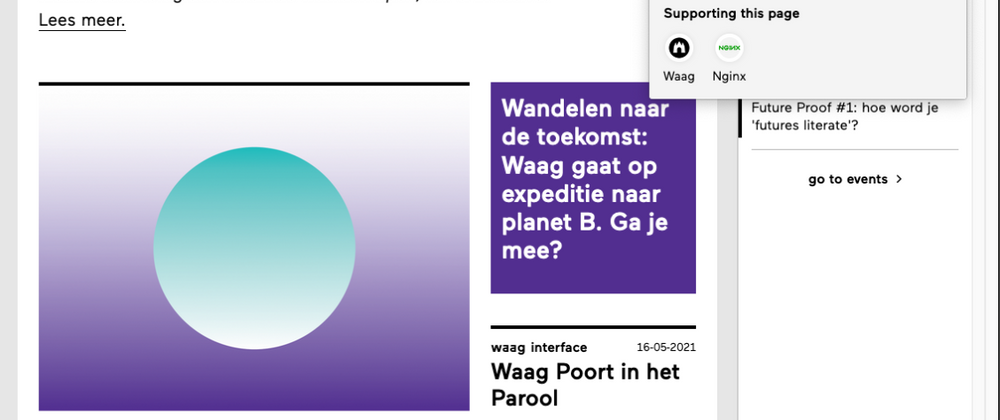Waag stands for open, fair and inclusive technology. In order to design and develop this technology, we developed the Public Stack: a layered model that aims to reveal the underlying assumptions and design process of technological innovations, to eventually develop technology that truly empowers citizens and is built on public value(s). Such a model for citizen-centric content and services accordingly requires citizen-centric business models. The MicroDonor project, spanning from January to June 2021, investigated whether and in what form a system of micropayments aligns with Public Stack-thinking. Does web monetization have the potential to fill the current gap in fair business models for open-source developers, content creators and online service providers?
Project Update
The MicroDonor project was an intense yet highly enjoyable period of six months. It entailed simultaneously a social and a technical research trajectory. We organized various kinds of activities (see in detail the Activities section below), ranging from public events to small-scale co-design sessions. It was great to encounter so much willingness to collaborate on behalf of experts we contacted, whether it be in the form of enthusiasm or skepticism on web monetization. The project additionally proved a valuable learning experience, with even the non-technical side of the team proud to have completely grasped micropayments by now.
Last week, we wrapped up the final stretch of the project, summarizing our findings in a report that showcases both the MicroDonor web extension prototype and discusses propositions for the future development of web monetization. The complete report can be found as publication on our website.
Progress on objectives
As we explained during the midterm progress report and in previous blog posts, we deviated slightly from the original plan. We were initially researching the setting up of an entire new web monetization provider, but moved away from this because of financial and infrastructural feasibility, as well as the lack of added value to our research question (is web monetization - as proposed by the API and facilitated by ILP - in line with the shared values advocated by the Public Stack model?). Instead, we developed an extension additional to the Coil extension that provides the user with more agency and transparency, turning micropayments into microdonations.
Furthermore, we enlarged the scope. Where we started out small with merely the development of the web extension prototype, we gradually came up with so many interesting findings and propositions that we eventually delivered a complete report with recommendations for the future design and development of web monetization.
Last but not least, where we originally aimed to present project results at a larger city-wide event in June, this event was postponed due to the COVID-19 situation. Instead, we made the most of the Grant for the Web workshop on 28 July by inviting experts that participated in the sessions and other partners of relevance to our demo presentation.
Key activities
On the one hand, we pursued technical research and development, documented in our GitLab repository. This eventually resulted in the MicroDonor web extension prototype. As a second track we tested web monetization for its ‘social’ value through a public event and number of co-design workshops. Throughout the entire project, we wrote a blog series as update, including visual materials. These posts start out as general background information on the project, and gradually dig deeper into micropayments and microdonations. They also provide a detailed description on the co-design sessions, public event, and technical developments. The final report covers this briefly as well, and provides the concrete conceptual propositions based off our analysis of web monetization through a Public Stack lens. All posts and the publication can be found under the Waag project page and on this community platform.
What’s next?
This project was a great first step towards truly citizen-centric web monetization, but there are so many new questions that came up and so much energy in the team that we are eager to keep our research going in some way. We are now looking into opportunities to continue investigating web monetization within the scope of the Public Stack model and projects on digital public spaces: could web monetization be a suitable business model for digital services and content, that aligns with public values?
What community support would benefit your project?
Feel free to contact us anytime if you would like to combine ideas or brainstorm on further steps! Mail Hannah, Tom or Taco [@] waag.org.



Top comments (0)